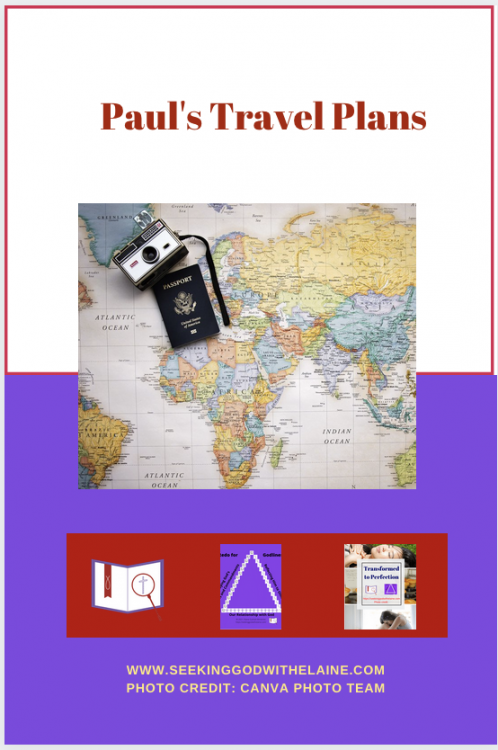The end of Romans 15 seems like a lot of personal references from Paul to the Roman church. This daily devotional looks at how we can apply Paul’s travel plans to our ministry.
Nuggets
- We have to follow God’s plan even if it contradicts our plans.
- Sometimes, unity takes work.
- God wants us to be unified in His name.
- We should pray for the ministry of others.
To read devotions in the Redo for Godliness series, click the appropriate button below.
Devotions in the Transformed to Perfection series
Devotions in the On Being a Minister series

It might be difficult to remember what Paul’s ministry looked like. He was a bi-vocational minister, as he practiced tent making to support himself.
While the synagogues were established, Christ’s church wasn’t. Paul was telling people who had never heard of God and Jesus about the Plan of Salvation.
To do this, Paul had to do a lot of traveling. He talked to the Romans about his travel plans.
Let's Put It into Context #1
Here is a running list of what we’ve discussed previously.
Let's Put It into Context #2
“My aim is to preach the gospel where Christ has not been named, so that I will not build on someone else’s foundation, but, as it is written, Those who were not told about him will see, and those who have not heard will understand” (Rom. 15: 20-21 CSB)
Paul had talked in Romans Part I that he wanted to come see them (Rom. 1: 9-13). Remember, Paul did not start the Roman church. He was, however, the consummate minister, so wanted to personally instruct them.
Paul’s Past Travel Plans
“That is why I have been prevented many times from coming to you. But now I no longer have any work to do in these regions, and I have strongly desired for many years to come to you whenever I travel to Spain. For I hope to see you when I pass through and to be assisted by you for my journey there, once I have first enjoyed your company for a while” (Rom. 15: 22-24 CSB)
We have to follow God’s plan even if it contradicts our plans.
I can see why Paul didn’t make going to Rome a priority. We had talked about how he went where the gospel had not been preached. It was his mission to lay the foundation where others hadn’t gone.
Let’s put this into perspective. Robinson wrote that Paul was completing his second missionary journey to Greece. He had already written the first letter to the Corinthians.
Resource
Lyth said that Paul could have been hindered from coming to Rome for a variety of reasons — some of them even good reasons. We like it when things are going good!
Resource
But think about it. The Roman church was established. That — technically — was outside of Paul’s mission.
Paul admitted Rome wasn’t the final destination. Spain was (Rom. 15: 24).
It probably would’ve been very easy for him to have written that they were the focus of his journey. It would’ve made them feel better. It would’ve made them feel special.
It would’ve been a lie.
I can see, though, why Paul would want to visit the church at Rome. We can definitely see his desire to go see them.
We can also see that Paul let God plan his itinerary. Paul knew he wasn’t in control.
Paul was very good at burying his I-would-rather and going with God-has-proclaimed. We need to do that, too.
If God wanted Paul to go elsewhere, He was going to take Him there. If God wanted Paul to go to Rome, He would get Him there.
Paul got to Rome — it was just in chains.
Paul’s Current Travel Plans
“Right now I am traveling to Jerusalem to serve the saints, because Macedonia and Achaia were pleased to make a contribution for the poor among the saints in Jerusalem. Yes, they were pleased, and indeed are indebted to them. For if the Gentiles have shared in their spiritual benefits, then they are obligated to minister to them in material needs” (Rom. 15: 25-27 CSB)
Sometimes, unity takes work.
When Paul was writing this, he was on his way to Jerusalem. Paul was working to promote unity.
That was a theme Paul had focused on during the last chapter. He was now showing the Romans a practical application.
Jerusalem disciples fell under hard times after the stoning of Stephen. Persecution had continued until they were now poor.
Paul appealed to the churches at Corinth, Galatia, Thessalonica, and Philippi to raise money for their aid. These verses say Macedonia and Achaia kicked in, too.
Now, this is real important. Because the Gentiles as taking up the offering are acknowledging Jerusalem and the Jews as the birthplace of the religion. The Jerusalem disciples by accepting the offering from the Gentile disciples are accepting them as disciples.
Robinson noted that the contribution Paul is talking about here is the one discussed at the Jerusalem Council.
“When James, Cephas, and John — those recognized as pillars — acknowledged the grace that had been given to me, they gave the right hand of fellowship to me and Barnabas, agreeing that we should go to the Gentiles and they to the circumcised. They asked only that we would remember the poor, which I had made every effort to do” (Gal. 2: 9-10 CSB).
To read a related devotion, click the button below.
Paul’s Future Travel Plans
“So when I have finished this and safely delivered the funds to them, I will visit you on the way to Spain. I know that when I come to you, I will come in the fullness of the blessing of Christ” (Rom. 15: 28-29 CSB)
God wants us to be unified in His name.
Paul had every intent to visit them on his way to Spain. He knew he would come in the fullness of the blessing of Christ. But what did that mean?
If God wants us unified, as Paul has been preaching, it would be safe to assume that He would bless the coming together of Paul and the Roman church. All the obstacles Paul had been encountering will have been eliminated. That means all the work God had for Paul to do will have been completed.
Dodsworth wrote, “All you want is treasured up in Him. We come, then, ‘in the fulness of the blessing of the gospel of Christ,’ if the fruit of our ministry be to make Him to dwell in our thoughts and hearts — if it be to set Him always before us in all things, and to do all things in His name.”
Resource
God will abundantly bless those unified in His Son’s name. We will bear fruit. “But the fruit of the Spirit is love, joy, peace, patience, kindness, goodness, faithfulness, gentleness, and self-control …” (Gal. 5: 22-23 CSB).
Prayers for the Ministries of Others
“Now I appeal to you, brothers and sisters, through our Lord Jesus Christ and through the love of the Spirit, to strive together with me in prayers to God on my behalf. Pray that I may be rescued from the unbelievers in Judea, that my ministry to Jerusalem may be acceptable to the saints, and that, by God’s will, I may come to you with joy and be refreshed together with you. May the God of peace be with all of you. Amen” (Rom. 15: 30-33 CSB)
We should pray for the ministry of others.
Paul knew that if the travel plans were going to come to fruition, the Romans needed to participate in intercessory prayer. Paul gave them bullet points for targeted prayer.
- Protection from unbelievers
- Success for his mission.
- A safe, restorative trip to Rome.
Paul was really good at including others on his ministry. He might have been the one who hoofed it around and hefted the pen, but he was always asking for others to come along side of him in prayer. He didn’t consider himself alone in the ministry.
Hall noted that appealing through the love of the Spirit “… is as much a motive to duty as the grace of Christ itself.” It shows love and obedience.
Resource
Paul knew that everything was under the control of the God of peace.

Making the Connections
We’re going to chase a rabbit. Roberts had an interesting sermon. He wrote,
“The Bible is emphatically a revelation, and not an argument; its teachings are dogmatic and absolute. You look in vain in the Bible for anything like an elaborate argumentation to prove the doctrine of the Trinity.”
Resource
God isn’t in the business of proving Himself to us. We have to have faith and believe. Faith is the conviction that the doctrines revealed in God’s Word are true, even if we do not understand all aspects of them, a belief which impacts our lives.
How Do We Apply This?
- Pray for the spread of the gospel to places where it has never been preached.
- Pray for those who have never heard the gospel message.
- Pray for God’s ministers who are doing His work that they may be protected and have success.
- We pray for the ministry of others. (Thank you for praying for this ministry. Pray that these words will reach others and speak to them to show them a loving God and a redeeming Savior.)
God has a ministry for each of us. He will provide ways for each of us to perform that ministry.
Father God. You have provided salvation for us. You use us to spread Your good news to others. Help us to learn from Paul how to be a part of Your ministry. Show us what You would have us do. Amen.
What do you think?
Leave me a comment below (about this or anything else) or head over to my Facebook group for some interactive discussion.
If you don’t understand something and would like further clarification, please contact me.
If you have not signed up for the email daily or weekly providing the link to the devotions and the newsletter, do so below.
If God has used this devotion to speak with you, consider sharing it on social media.